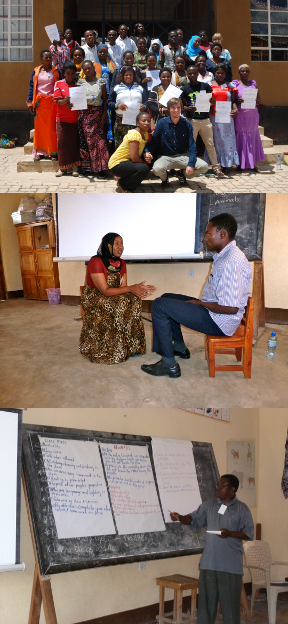In Tanzania corporal punishment and other forms of harmful punishment are very common and still lawful both in the family and at school. A representative national survey has shown that three quarters of Tanzanian adolescent have experienced physical violence and one quarter have experience emotional abuse during their upbringing. vivo international has found similar results in a cross-sectional study of more than 400 Tanzanian primary school students. Furthermore, we found that family violence, emotional neglect, and corporal punishment at school affected the psychological well-being of these children severely. Furthermore, school achievement and cognitive abilities were negatively influenced by harmful punishment.
Therefore, vivo international has recently developed a cultural-sensitive training to prevent harmful forms of punishment during the upbringing of children. In December 2013 we have conducted two trainings in Iringa, Tanzania. In the first training we trained about 25 caregivers from different institutions in positive parenting and non-violent caregiving strategies. The second training was designed for primary school teachers and focused on reinforcement systems and non-violent punishment. In total, 25 primary school teachers took part in the second training. Many participants appreciated the open atmosphere and the participative character of the trainings.
With these trainings vivo international aims to enable more children to grow up in a respectful and supportive atmosphere, thereby strengthening their healthy development. Moreover, we hope for a societal change regarding the perception and attitudes of parents, caregivers and teachers towards harmful forms of punishment against children.
In Tanzania corporal punishment and other forms of harmful punishment are very common and still lawful both in the family and at school. A representative national survey has shown that three quarters of Tanzanian adolescent have experienced physical violence and one quarter have experience emotional abuse during their upbringing. vivo international has found similar results in a cross-sectional study of more than 400 Tanzanian primary school students. Furthermore, we found that family violence, emotional neglect, and corporal punishment at school affected the psychological well-being of these children severely. Furthermore, school achievement and cognitive abilities were negatively influenced by harmful punishment.
Therefore, vivo international has recently developed a cultural-sensitive training to prevent harmful forms of punishment during the upbringing of children. In December 2013 we have conducted two trainings in Iringa, Tanzania. In the first training we trained about 25 caregivers from different institutions in positive parenting and non-violent caregiving strategies. The second training was designed for primary school teachers and focused on reinforcement systems and non-violent punishment. In total, 25 primary school teachers took part in the second training. Many participants appreciated the open atmosphere and the participative character of the trainings.
With these trainings vivo international aims to enable more children to grow up in a respectful and supportive atmosphere, thereby strengthening their healthy development. Moreover, we hope for a societal change regarding the perception and attitudes of parents, caregivers and teachers towards harmful forms of punishment against children.


